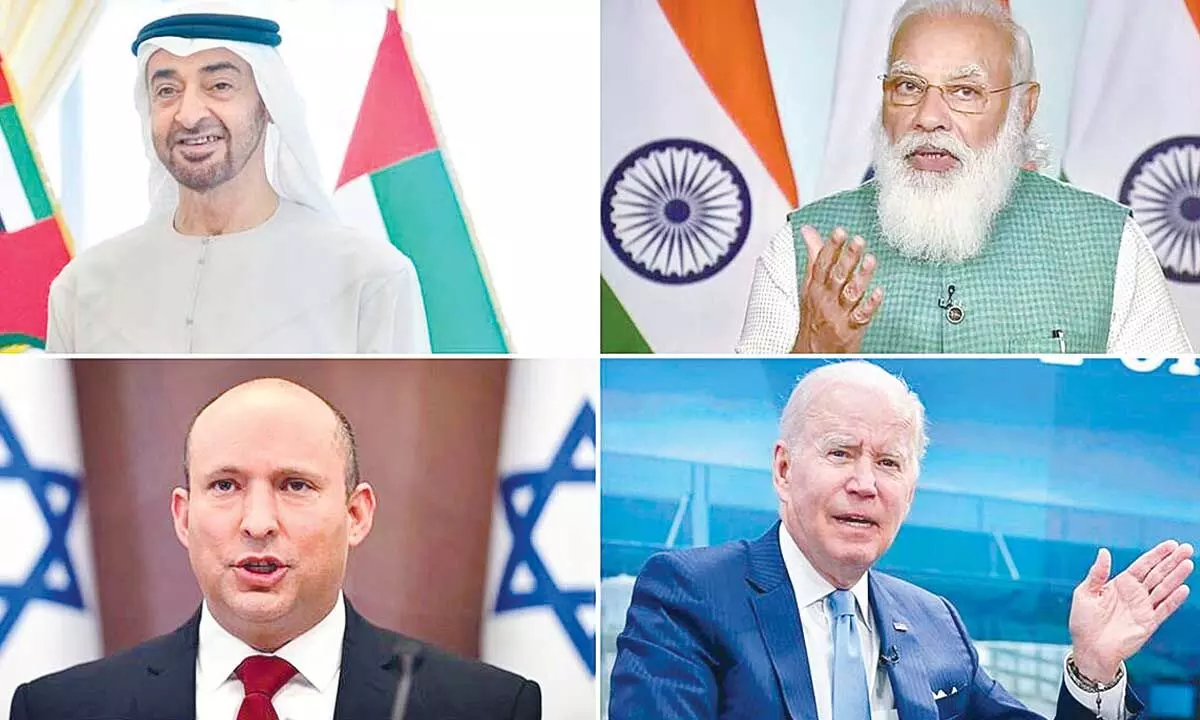An opportunity to look beyond Ukraine conflict
The virtual summit will see 4 countries come together to leverage their strengths for the benefit of their people
image for illustrative purpose

The ever-changing world order necessities that International relations and Diplomacy are in constant flow and shift to match the global reality. The first I2U2 summit on 14 July 2022, hosted by US President Joe Biden, reflects this new normal in the world's geopolitics.
What are I2U2 Initiative and its importance?
The I2U2 virtual summit will see four countries come together to leverage their respective strengths for the benefit of their people.
The "I2" stands for India & Israel, and the "U2" for the United Arab Emirates and the United States. "The I2U2 group was established, according to the White House, as part of US government efforts to re-energise and rejuvenate American ties" around the world. President Joe Biden will be hosting the first-ever I2U2 summit during his visit to Israel.
Prime Minister Narendra Modi, President of the US Joe Biden, President of the UAE Sheikh Mohamed bin Zayed Al Nahyan and newly elected Prime Minister of Israel Yair Lapid will participate in the I2U2 Leaders summit. The new global alliance was dubbed the "West Asian Quad'" by UAE Ambassador to India Ahmed Albanna.
The participating countries will share several global challenges that can be addressed fruitfully with their collaborative efforts and complementing strengths. Thus, the summit will focus on food security, space, health, water, energy and transportation.
According to India's Ministry of External Affairs (MEA), the summit "intends to mobilise private sector capital to help modernise the infrastructure, low-carbon development pathways for our industries, improve public health and promote the development of critical emerging and green technologies."
Background of the I2U2 Group
"When India's External Affairs Minister S Jaishankar visited Israel in October 2021, a meeting of the four countries' foreign ministers took place. The four-nation coalition was known at the time as the 'International Forum for Economic Cooperation." This time, the meeting between the four nations will involve heads of government/states, and it is an important next step in formalising and adding significance to the alliance.
What does the I2U2 summit mean for the Indo-US relationship?
As the saying goes, "when running water stops, it grows stale", so is true for international relationships. In recent decades, "Diplomacy has become more global, complicated and fragmentary." Thus, countries must find new ways to keep themselves relevant in ever-changing global politics to navigate new challenges and tap into emerging opportunities.
The ongoing Russia-Ukerian war created serious fissures between emerging allies India and the US, resembling the cold-war era mistrust.
Since February this year, Indo-US relations have been under strain, with India doing most of the heavy lifting to prove its neutral stand in the ongoing conflict. On multiple occasions during the past months, on international forums, India's Foreign Minister S Jaishankar had to employ his diplomatic mastery to ensure India was seen as non-aligned while securing its security and geopolitical interests. The Minister seized all opportunities to highlight India's energy security challenges and its need to secure them.
From 2014, till the start of the Ukraine conflict, India was seen leaning toward the West, especially the US, under the leadership of PM Modi, thereby drawing an inference that Bharat was forging new partnerships at the cost of old ones especially with Russia. The diversification in defence procurements, which was till then largely dependent on Moscow, is a case in point.
Further, "After several years of growing tensions with China on a range of topics, and particularly after the 2017 border standoff, India joined the QUAD, also known as the 'Quadrilateral Security Dialogue.
This "informal strategic forum" comprising the US, India, Australia, and Japan was formed to "strategically counter China's economic and military rise" and keep the Indo-Pacific region "free, open, inclusive, and unconstrained by coercion." Such a marriage of geopolitical vision between India and the US fueled speculation that India was firmly into the Western camp.
According to a military-political observer who has a special interest in the Indo-US relationship (he doesn't want to be named), the Russia-Ukraina conflict raised serious concerns within the Washington power circles if India was one with the US on the current and future geopolitics of the world.
In the backdrop of the Ukraine war, where New Delhi and Washington DC had an incompatible stand- the I2U2 summit will ensure the water doesn't get stale.
"Nowadays, the role of the state has changed in response to the rapidly changing international environment and the involvement of new actors. The result, of course, is that Diplomacy has changed with it. Multilateral processes connected to security, economic, social, technological and other changes influence the essence of modern Diplomacy", wrote Didzis Klavins, a Senior Researcher at the University of Latvia, in his paper titled The Transformation of Diplomacy.
President Joe Biden will travel to the Middle East, making stops in Israel, the West Bank and then Saudi Arabia, "where he'll seek to rebuild relations after vowing to make the kingdom" a "pariah." Thus the summit provides India with an opportunity to find convergence in its international outreach that addresses its internal and external needs and challenges.
(The author is Founder of MyStartup TV)

